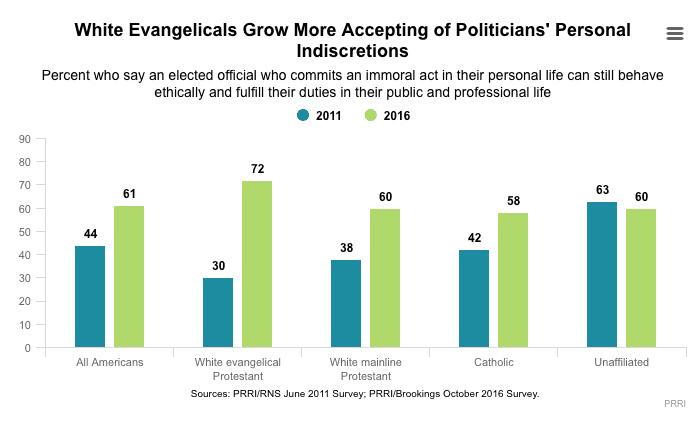Much ink has been spilled over the last two years over how evangelicals could go from censuring Bill Clinton for having an affair with his intern to lauding Donald Trump, who openly boasted of sexually assaulting women, cheated on his first two wives, and made a habit of walking in on and ogling undressed underage Miss American contestants just because he could. How do we get from there, to here?
In an attempt to answer this question, this graph has got to be one of the most fascinating I have ever seen:

In 2011 only 30% of white evangelical Protestants agreed that “an elected official who commits an immoral act in their personal life can still behave ethically and fulfill their duties in their public and professional life.” That same year, 44% of the American public and 63% of the unaffiliated agreed with that statement. Five years later, in 2016, a full 72% of white evangelical Protestants now now agreed with that statement, a stunning shift that dwarfed change in any other group.
This means that within five years, white evangelical Protestants went from being the most strict about politicians’ personal lives of any group to being the least strict of any group. And it’s not as though there was some sort of equivalence on the Left—while the unaffiliated did become slightly more strict about elected officials’ personal lives between 2011 and 2016, the change was only 3% (in 2011, 63% of the affiliated agreed with the statement that an elected official could be personally immoral but professionally ethical; in 2016 that number was 60%). Compare that to to white evangelical Protestants’ whopping 42% change.
What is going on here? Some evangelicals think they know.
David Brody, a correspondent for the Christian Broadcasting Network who has co-authored a forthcoming “spiritual biography” of Trump, said many outside observers fail to grasp the desperation and urgency felt throughout much of conservative Christianity.
“The way evangelicals see the world, the culture is not only slipping away—it’s slipping away in all caps, with four exclamation points after that. It’s going to you-know-what in a handbasket,” Brody told me. “Where does that leave evangelicals? It leaves them with a choice. Do they sacrifice a little bit of that ethical guideline they’ve used in the past in exchange for what they believe is saving the culture?”
Apparently it’s really difficult to just answer the question with Trump. Look, evangelicals feeling like the culture is slipping away by itself does not explain this change. They’ve felt like this for a long, long time. There is no reason for evangelicals to change their views on politicians’ personal lives unless they are confronted with a situation where there is someone running for political office who has a sordid past yet somehow still makes evangelicals think that he’s their savior and that rainbows and unicorns are shooting from the sun.
I didn’t have evangelical relatives sending me chain emails urging me to vote for McCain in 2008 or Romney in 2012, but I sure did have evangelical relatives sending me chain emails urging me to vote for Trump last year. For god only knows what reason, evangelicals fell in love with Trump, and obligingly shed their objection to politicians with immoral personal lives. Brody would do better to just admit that, to name names rather than leaving his response faux ambiguous.
White evangelical Protestants decided that politicians’ personal lives don’t matter because Donald Trump, a rich philanderer, promised them that he would fix the country and restore it to its former greatness, and they believed him. End of story.















